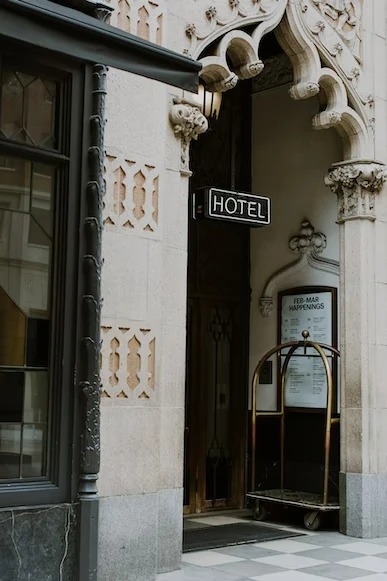5 Management Lessons Big Hotel Chains Can Learn From Boutique Hotels
7 November 2022
Share this article on social networks:
The hotel trade is very diverse. Boutique hotels are a fascinating niche in the industry. For the purpose of this article, the Oxford English Dictionary defines a boutique hotel as “a small stylish hotel, typically one situated in a fashionable urban location.” It is a hotel that relies on having unique character, design, decor, and personalized service.
Boutique hotels rely on being unique and classy. Therefore, it shouldn’t be surprising that these hotels, typically having 100 rooms or less, possess innate strengths that allow them to compete with bigger and more powerful hotel chains. Let’s delve into five ways in which boutique hotels have an edge over their bigger, better-known competitors.
Table of contents
Table of contents
In order to be different, boutique hotels have come up with clever design tricks to maximize space and keep costs lower. One example is The Arlo Nomad in New York. Their rooms offer king-sized beds for maximum comfort. They save space by having bedside lamps suspended from above, while a flip-up tray provides just enough room for a book and glass of water.
Boutique hotels can afford to be daring and eccentric in their designs. Conversely, large chain hotels are shackled by strict branding requirements, from color schemes to choice of fabrics and furniture. A pre-approved Property Improvement Plan (PIP) ensures the one thing that hotel chains strive for the world over: consistency. Boutique hotels are the antithesis of bland consistency.
One way boutique hotels achieve this is by implementing smart hotel maintenance regimes, including computerized maintenance management system (CMMS) software. Hotel assets last longer and work better due to 24/7 monitoring and automated maintenance scheduling. These maintenance cost savings help boutique hotels maintain their more competitive revenue rates per available room or RevPar.
Smaller organizations tend to be nimbler and, therefore, able to quickly respond to sudden shifts in the market or ‘black swan’ events. The COVID-19 pandemic was an excellent example of this – a black swan event that devastated much of the industry. Tom Fisher, chief investment officer (CIO) at Pebblebrook Hotel Trust, believed that the inherent flexibility of being an independent hotel group meant that they could respond decisively to protect each of their assets during the pandemic.
Adding to the flexibility of boutique hotels is that they are unfazed by hotel branding or franchise demands. They can quickly adapt and change their look and appearance when so needed. In recent years, we’ve heard rumblings that the high costs of being a franchise owner erode profit margins, particularly with the ever-growing market share of independent or boutique hotels.
It’s very simple: boutique hotels have to be smarter in their marketing because they cannot rely on name recognition and brand ubiquity as large hotel groups are able to. Necessity breeds innovation in that regard. Furthermore, they are not hobbled by the marketing diktats of large hotel chains. Hotel franchisees do not have much freedom with their marketing initiatives and can often be at the mercy of outdated marketing strategies and materials demanded by the head office.
One way in which boutique hotels have proven savvier with their marketing is influencer marketing. This digital era form of marketing is far more powerful than traditional advertising or celebrity endorsements, with a survey finding that 92% of modern customers trust an influencer more than they do a celebrity or traditional ad. Boutique hotels can use their size and uniqueness to partner with influencers. Hotel influencers with a huge online following are much sought-after marketing allies for some boutique hotels.
Smaller hotels cannot rely on loyalty programs or mere name recognition, so, unsurprisingly, the guest experience becomes far more vital for them. A clever way to achieve this is by means of niche travel, by which hotels leverage specific themes or lifestyles. Luxury boutique hotels have been particularly adept at this, offering everything from all-inclusive yoga retreats to creating a full-on ‘gentleman’s experience’ with a whiskey bar, cigar bar, and first-class gym. Contrary to popular belief, there are boutique hotels that are very kid-friendly. They achieve this with unique room configurations and inviting common areas where children can enjoy themselves. Other forms of niche travel at which boutique hotels excel include:
- rural tourism
- cultural tourism
- beach tourism
- religious tourism
Large chain hotels undeniably enjoy clear advantages with their economies of scale and established brand recognition. They nevertheless have much to learn from boutique hotels, including their flexibility and adaptability, not to mention their strengths in design and guest experience.
A niche in the hotel trade, boutique hotels are thriving precisely because they exploit the niche attributes that make them unique. In the hotel trade, sometimes going small is better.
Bryan Christiansen is the founder and CEO of Limble CMMS. Limble is a modern, easy-to-use mobile CMMS software that takes the stress and chaos out of maintenance by helping managers organize, automate, and streamline their maintenance operations.
Book a Free Demo
Book a Demo to see how Octorate can simplify the management of your Hotel, B&B, Vacation rental, Apartment or Hostel.
Share this article on social networks:
Limble
Book a Free Demo
Book a Demo to see how Octorate can simplify the management of your Hotel, B&B, Vacation rental, Apartment or Hostel.
You may also be interested in:
Best property management software: Octorate or Amenitiz?
Share this article on Social Networks:When it comes to managing a modern hospitality business, the stability...
Octorate vs Lodgify: Property management softwares compared
Share this article on Social Networks:In the competitive hospitality sector, choosing the right property...
Best Channel Manager: Top 7 of 2025
Share this article on Social Networks:In the hospitality sector, managing bookings and sales channels can...




